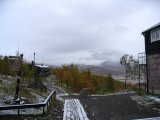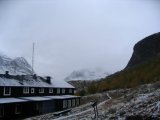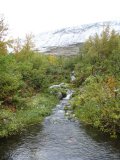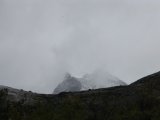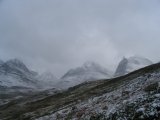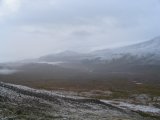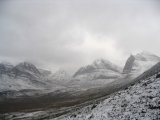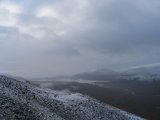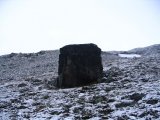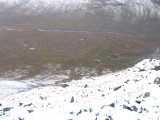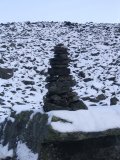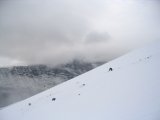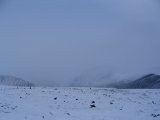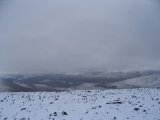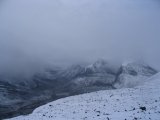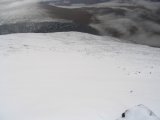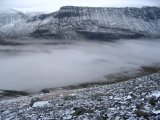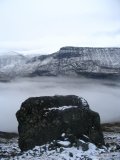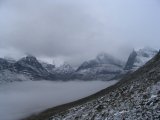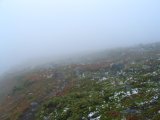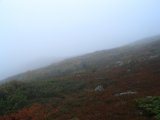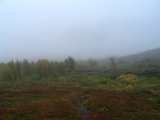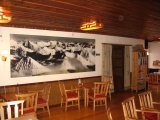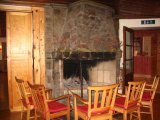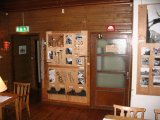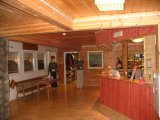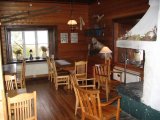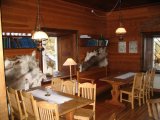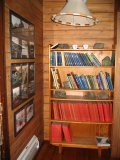Wednesday 14/9 – foray one
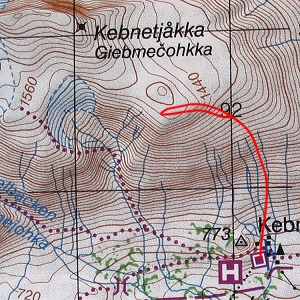
Giebmečohkka
| Horizontal distance: | 5.5 km |
| Vertical distance: | +800 m, -800 m |
| Time: | 3 h |
| Lunch break: | 2 h |
| Dinner: | – |
| Night accommodation: | – |
| Stage classification: | Medium |
I climbed out of bed at 07:00 and was once again greeted by a snowy ground and low clouds, this time also coupled with rain. Still, I could hardly stay inside; both from a general aversion to doing just that when in the fjelds, and from feeling a need to earn the dinner at the restaurant. Already the day before, I had more or less decided on climbing Giebmečohkka, so after breakfast I put a few essentials into the detachable top cover of my rucksack and donned the rain clothes.
I set out after 9, just as the first helicopter of the day arrived. I followed a path that leads to an erratic, called Storsten, up in the slope behind the station. Up to the block, the ground consisted of grass and heath, which posed no immediate problems. Further up, however, things were different; there was no path, and there was nothing but snow-slippery stones beneath my feet. There was a steep section with larger rocks where extra caution was required, and I was very glad to have my staff. After that, there were a few patches of meager grass, and the slope was more gentle.
Ironically enough, visibility improved as I ascended. I could see most prominent features in most directions, with the notable exception of Giebmegáisi itself (figures). There was even a bit of clear sky to the north. After a while, I came across some cairns of varying sizes – this being, after all, the recommended route upwards – but they quickly either ended or blended in with the environment. As can be seen below, it was practically full winter in the higher regions, albeit with a modest temperature. The rain had all but ceased, and was instead replaced by a somewhat noteworthy wind.
I reached the plateau, which offered veiled sights of Södra Klippberget and Darfálčorru. I continued up onto the ridge which later grows to the minor peak of Giebmečohkka, but I didn't feel like actually mounting that, as it was still several hundred meters away, and since the view wouldn't be any better from there. Instead, I simply walked to the western edge of the ridge, checking in on the by now overly familiar mountains in that direction, and then returned eastwards along the southern edge.
Once I reached the slope near where I came up, one thing was clear: I would have to slide down that snowfield! I did just that, in stages, as the snow was such that it did not permit prolonged continuous motion; no danger of losing control, in other words. I found my own footprints from the way up, so I followed those down to the steep section, where the better overview the downward-facing perspective offered allowed me to pick an easier way than before.
Having passed Storsten, I noted that the snow was gone from the ground – or, rather, it had turned liquid. As a consequence, the path through the ankle-deep vegetation turned out to be the trickiest passage of all, since wet grass and the like in a slanting environment is among the most uncertain surfaces there are, foothold-wise. I even managed to fall over once, and the descent itself took its toll on my knees.
I soon entered the cloud I had observed drifting in from the east, evidently stretching across the entirety of Láddjuvággi. Visibility immediately dropped drastically, and once I got below the cloud there was rain anew. I was glad that I had made the decision to reach higher ground early in the day, as those who had remained at the station hardly could have seen anything, and would now be under the impression that there was nothing but rain and fog to be had if they were to go outside.
I got back at noon, and then went to the service building, which again seemed empty, to have lunch. The dreary weather persisted, and the west was a white wall, plain and simple. I took it easy, peeking around the station, which despite its size and modern comforts still manages to feel rather cozy and intimate. There was also a myriad of paraphernalia from the olden days on display here and there, well worth a look or two.
